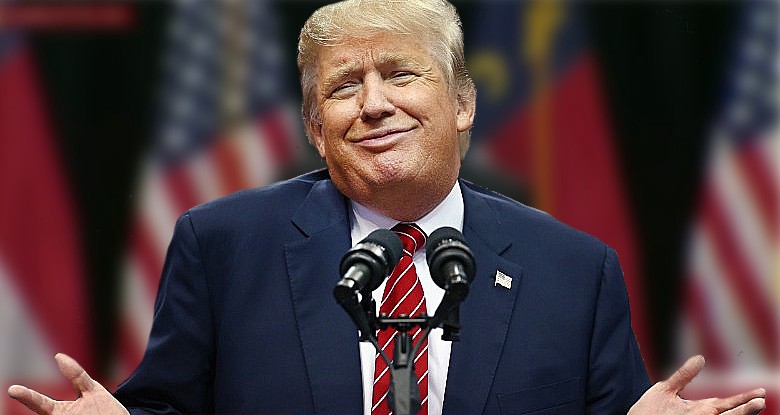The Signature Moment of Donald Trump's First 100 Days
Step Into A Cringe Binge
The signature moment of Donald Trump’s first 100 Days

Three simple nouns, tightly linked, can evoke worlds. Think of Joyce’s famous dictum, from Portrait of the Artist: “I will try to express myself in some mode of life or art as freely as I can … using for my defense the only arms I allow myself to use — silence, exile and cunning.” Pretty great, right?
Or consider this: lions and tigers and bears.
Or the kingdom, the power and the glory.
There’s a resonance to that classic triplet combination. But if we try to capture something as simultaneously earth-shaking and petty as President Trump’s first three months in office using that same formula, we run up against a predicament as thorny as it is slimy. How do you select the right three nouns, when the president and the creepy totalitarian assholes he’s invited into the White House have given us so many plausible descriptors to work with? Incompetence, oligarchy and treason? Nepotism, autocracy and smarm? Arrogance, greed and turbo-misogyny?
I’m going to go with something pretty straightforward — lies, bluster and puerility — citing what, to my mind, endures as the signature moment of Trump’s first 100 days in office: namely, the cringe-inducing 30-second exchange at his first press conference in mid-February, when NBC’s Peter Alexander called the president out, twice, for wrongly asserting that his electoral-college margin of victory was the largest in four decades.
“You said today that you had the biggest electoral margin since Ronald Reagan,” Alexander began. He then read a list of several recent presidents who had larger — in some cases much larger — margins than Trump’s.
“Why,” Alexander then asked, “should Americans trust you?”
Trump tried to deflect, suggesting that he had been talking about Republican presidents (for which he would still be wrong, even if he meant it) before lamely muttering that he was simply “given” that information. Alexander persisted.
“Why should Americans trust you?” he asked again.
“I don’t know,” Trump said, before again stating that he “was just given that information.” Then, like a not-very-bright kid caught in one fib, embellishment or outright lie after another, but never, ever called to account for it, Trump grasped at the slenderest of reeds.
“Actually,” he said, “I’ve seen that information around.”
Having had yet another of his many, many untrue, self-aggrandizing assertions publicly proven false, the president then ineptly tried to turn the tables. With a smirk on his lips that resembled nothing so much as a bloodworm writhing in the sun, Trump said to Alexander: “But it was a very substantial victory. Do you agree with that?”
I don’t know. I was given that information. I’ve seen that information around. It was a substantial victory.
So many things about this brief back-and-forth are so eminently fucked up that it’s hard to know where to start. But let’s begin where Trump did: with his margin of victory. The president won 304 electoral votes to Hillary Clinton’s 227. (Five Democratic and two Republican “faithless electors” voted for other candidates.) In 2008, Obama won 365 electoral votes; in 2012, he won 332. Bill Clinton won 370 and 379 electoral votes in his two victories in ’92 and ’96. In 1988, George H.W. Bush won 426 electoral votes to Mike Dukakis’ 111.
That’s five elections since Ronald Reagan was in office when the victor — including one Republican — garnered more electoral votes than Trump. Why would the president of the United States act this way? Why would he so blithely gibber falsehoods in public — especially about something so ultimately pointless?
One answer, of course, is that Donald Trump is a man forever ready to embrace any self-mythologizing nonsense that’s dropped in his lap, no matter how easily it can be refuted, as long as it adequately fellates his prickly ego. But more alarming than the no-doubt dark, deep-seated reasons behind Trump’s willingness — indeed, his eagerness — to lie about pretty much everything is the utter lack of logic, self-awareness and, above all, leadership that he displayed during that brief exchange with Alexander.
This, it seems, is what passes for mental rigor in the mind of a man tens of millions of Americans still worship as a populist savior and swamp-drainer. Note the sequence:
Step 1: Repeat small lies that your minions hand you as talking points, or larger, nastier lies that spittle-flecked talk-radio hosts and white supremacists tweet at you in the wee hours.
Step 2: When shown that your assertions are false, don’t acknowledge that you’re wrong. Instead, shrug, grin, shuffle, evade and, finally, shift blame elsewhere — preferably on to the shoulders of an unnamed underling.
Step 3: Pretend the whole thing doesn’t matter, anyway, because words and numbers and colors, flags, jobs, walls, media, enemies, immigrants, next question, no, not you, not you, yes, you, the black lady over there.
In the end, that 30-second exchange, less than a month into Trump’s presidency, eerily encapsulates so much of what is distressing and so much of what feels so slippery and dangerous about Donald Trump. His ridiculous claim about his margin of victory is hardly the most appalling of his incessant lies, misrepresentations and distortions over the past many, disgraceful months. But it was our clearest glimpse yet — if not our last, alas — into the charnel house that serves as the man’s imagination: a place where curiosity goes to die, and where undead half-truths shuffle in the dark until their keeper opens his mouth and frees them again.
Lies, bluster, puerility. It has a certain ring, doesn’t it? Like an alarm. Or a long, slow, unanswerable death knell.
